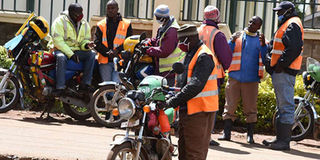Breaking News: KDF chopper crash kills five in West Pokot
Rift Valley locals justify violating Covid-19 rules

Boda-boda riders defy social distancing rules, at Eldoret High Court in Uasin Gishu County on April 18, 2020. PHOTO | FILE | NATION MEDIA GROUP
What you need to know:
- Turbo Deputy County Commissioner Mohammed Mwabudzo has been sensitising matatu operators on the need to observe social distance.
It is still business as usual for Rift Valley residents as the social distancing rules remain alien.
The Nation team found that Uasin Gishu, Baringo, West Pokot, Turkana, Nandi and Elgeyo-Marakwet locals and businesses have yet to take the matter seriously.
Bus terminals, chang’aa dens, supermarkets and cyber cafés are the most affected places. Though many people have face masks, the items are not handled properly.
Boda-bodas and matatus are impediments to the war on the coronavirus, with riders crowding at one place and carrying many passengers.
“It is difficult to observe social distancing because our job requires closeness with customers. We have sanitisers and encourage one another to carry one passenger,” Mr Geoffrey Kemei, a rider in Eldoret, said.
Mr Jared Omito, a tout in the same town, said scrambling for passengers is inevitable. “We find ourselves breaking the rules because competition is he said.
In some supermarkets and agro-vets, customers queue closely to be served, with many mingling freely.
BEHAVIOUR CHANGE
Turbo Deputy County Commissioner Mohammed Mwabudzo has been sensitising matatu operators on the need to observe social distance.
“Ending this pandemic is a collective responsibility,” Mr Mwabudzo told them on Wednesday.
Some businesswomen are, however, keen on social distancing. Greengrocers at Matharu shopping centre on the Eldoret-Nakuru road, are one such group.
“We will do all we can to observe the new rules. We depend on the business to feed our families,” Ms Teresia Wairimu said.
Little has changed in West Pokot. Customers get into banks, supermarkets and other places without observing social distancing.
Residents of Alale, Masol, Ombolion and other remote regions do not bother washing hands or wearing masks. They have never stopped shaking hands like before.
In Makutano, motorbikes still carry two to three passengers. Mr Luke Wasike said carrying more people earns him more “in these difficult economic times”.
“We cannot operate at night because of the curfew, and carrying one person is uneconomical. Having a new face mask daily is expensive,” Mr Wasike said.
AWARENESS DRIVE
Mr Benjamin Lopuonyang, a Kapenguria resident, said remote areas have not been sensitised on face masks. “The literacy rates here are discouragingly low,” he said.
At Lodwar fresh produce market, social distancing is not a priority. Traders scramble for customers at the gate.
There are crowds at shops, boda-boda stages and miraa and muguka stalls. It is not strange to witness a rider without a mask carrying three passengers at Turkwel bridge.
Tired of seeing locals flout the Ministry of Health guidelines, youth leaders say they will launch a Covid-19 sensitisation campaign next week.
Mr Paul Jalinga and Mr Prothet Lokosi said: “We will team up with the county Covid-19 response team to create awareness,” Mr Jalinga said.
POOR SANITATION
County Commissioner Muthama Wambua said salons and barber shops — some ordered shut weeks ago — are ignoring the social distance directive.
“Patrols are on. We will arrest owners of salons and barber shops still operating. Fifteen have been closed already,” he said and advised locals to buy reusable face masks.
In Elgeyo-Marakwet, hundreds of locals displaced by floods said it is impossible to observe the distancing rules while cramped in camps.
“Almost all camp dwellers do not have masks,” Mr Francis Kipkura, one of the displaced people at Wewo Primary School, said.
Tea workers in Nandi are in fear since most families live in congested houses. They also share bathrooms.
By Onyango K’onyango, Sammy Lutta, Oscar Kakai, Evans Kipkura and Tom Matoke




